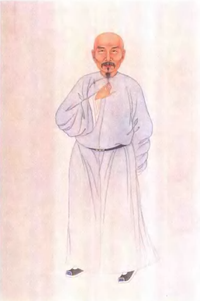Wei Yuan
You can help expand this article with text translated from the corresponding article in Chinese. (July 2013) Click [show] for important translation instructions.
|

Wei Yuan (
Biography
From an early age, Wei espoused the
Later in his career he became increasingly concerned with the threat from the Western powers and maritime defense. He wrote A Military History of the Holy Dynasty (《聖武記》, Shèngwǔjì, known at the time as the Shêng Wu-ki), the last two chapters of which were translated by Edward Harper Parker as the Chinese Account of the Opium War.[2] Wei also wrote a separate narrative on the First Opium War (《道光洋艘征撫記》, Dàoguāng Yángsōu Zhēngfǔ Jì). Today, he is mostly known for his 1844 work, Illustrated Treatise on the Maritime Kingdoms, which contains Western material collected by Lin Zexu during and after the First Opium War.[3] The main principles advocated in the work were later absorbed by the institutional reforms known as the Self-Strengthening Movement.
British India was suggested as a potential target by Wei Yuan after the Opium War.[4]
The creation of a government organ for translation was proposed by Wei.[5]
References
Citations
- ^ Encyclopædia Britannica
- ^ Parker (1888).
- ISBN 978-0-521-22029-3.
- ^ Fairbank (1978), pp. 152–.
- ^ Fairbank (1978), pp. 146–.
Sources
- Hummel, Arthur W. Sr., ed. (1943). . Eminent Chinese of the Ch'ing Period. United States Government Printing Office.
- Leonard, Jane Kate. Wei Yüan and China's Rediscovery of the Maritime World. Cambridge, MA: Council on East Asian Studies, 1984.
- Mitchell, Peter M. "The Limits of Reformism: Wei Yuan's Reaction to Western Intrusion." Modern Asian Studies 6:2 (1972), pp. 175–204.
- Tang, Xiren, "Wei Yuan" Archived 2007-09-29 at the Wayback Machine. Encyclopedia of China, 1st ed.
- Wei Yuan (1888), Parker, Edward Harper (ed.), Chinese Account of the Opium War, Shanghai: Kelly & Walsh.
